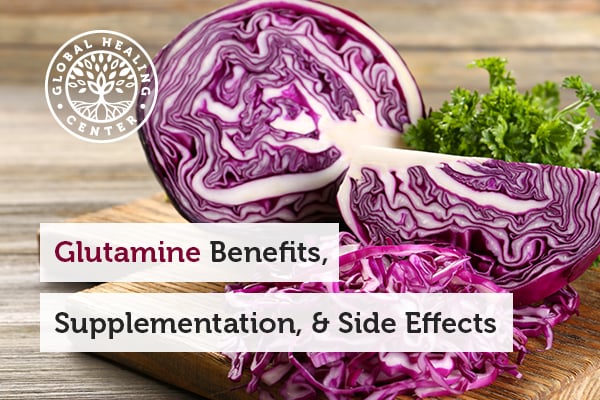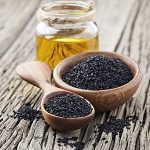
Glutamine is an amino acid that is vitally important to health and well-being. As the most abundant amino acid in the body, it supports more metabolic processes than any other.[1, 2] Glutamine encourages a healthy gut, promotes normal blood sugar levels, and is a building block for muscles.[3, 4] In the body, glutamine is stored in skeletal muscle; it circulates in the blood to the kidneys, liver, intestines, and immune cells where it helps perform critical functions.[5]
Benefits of Glutamine
Glutamine supports a number of important functions in the body, including the immune system, the body’s detoxification abilities, gut health, and even muscle growth and repair. Let’s take a closer look at how glutamine enables these actions.
Detoxification and Liver Health
Consuming meat can cause ammonia to build up in the body, negatively affecting the brain and liver. As support for the kidneys and liver, adequate glutamine stimulates the body’s detoxification processes to regulate ammonia levels.[6] Glutamine also promotes liver metabolism and proper pH balance.[7]
Gut Health
The digestive tract has a protective barrier known as the mucosa. Without this protection, toxins and harmful organisms could leak from your gut into your body — a condition known as leaky gut.[8] Glutamine supports the mucosal lining and studies have evaluated the relationship between glutamine and gut health. One study reported that glutamine might reduce occurrences of diarrhea in people with digestive ailments.[9]
Promotes Normal Body Weight
Some illnesses can cause wasting — severe, unintended weight loss. In one study with HIV patients, glutamine proved to be a cost-effective therapy to help maintain body weight. Promoting gut health and improving nutrient absorption are among the methods of action by which glutamine promotes normal body weight.[10]
Recovery and Immune Health
Because amino acids are the building blocks of muscles, glutamine is a popular supplement among athletes seeking to hasten recovery. Glutamine may also support endurance during aerobic exercise.[11]
Strenuous exercises like marathon running can wear down a healthy immune system. It's not uncommon for runners to feel ill following a long race. One double-blind placebo-controlled study had a group of athletes take a glutamine supplement immediately following two hours of intense exercise. During the seven days that followed, the athletes who took the glutamine supplement said they felt better than those who did not.[12]
Other Health Benefits of Glutamine
- Beneficial for some intensive medical treatments.[13]
- Might help support growth hormone levels.[14]
- Preserves gut integrity.[15]
- May help with nutrient absorption.[16]
- Supports brain health.[17]
- Supports memory.[18]
- May curb cravings for alcohol.[19]
- Supports the body’s ability to heal wounds.[20]
- Helps regulate blood glucose levels.[21]
- Resists harmful organisms.[22]
Best Sources of Glutamine
Your body produces glutamine, there are also dietary sources of glutamine such as raw vegetables and nuts, as well as meat, eggs, and dairy. Glutamine can also be obtained through supplementation.
Vegan Food Sources of Glutamine
Below are nine vegan food sources of glutamine. Be advised that vegetable sources of glutamine should be eaten raw because high heat breaks down glutamine and negatively affects its bioavailability.[23]
- Red Cabbage
- Nuts
- Beans
- Legumes
- Spinach
- Parsley
- Broccoli
- Beets
- Asparagus
Glutamine Supplements
Most healthy adults receive adequate glutamine from either their body's natural production or their diet. In some instances, glutamine supplementation may be warranted or desired. Because of its close relationship with muscle mass, glutamine supplements are popular among bodybuilders and weightlifters.[24] Additionally, doctors may recommend supplemental glutamine for gastrointestinal issues or other health concerns.[25]
Glutamine has few, if any, side effects and is generally considered safe. If you and your trusted health care provider decide a glutamine supplement is right for you, choose a plant-based formula from a reputable company. Avoid products with synthetic, animal-based, or artificial ingredients.
When comparing glutamine supplements, you may see some products advertised as "glutamine" and some advertised as "L-glutamine." Glutamine, like other amino acids, exists in two distinct forms: L-glutamine and D-glutamine. L-glutamine is the form most desired by your body. All glutamine supplements, even if they only say “glutamine,” are L-glutamine.
Does Dr. Group, DC Take a Glutamine Supplement?
Personally, I don’t take a standalone glutamine supplement. I follow an organic, plant-based diet that provides the majority of the nutrients I need. To fill any gaps in my diet, I take intraMAX® 2.0. It’s a liquid multivitamin that provides over 415 essential vitamins and minerals (including glutamine), each one derived from natural and organic plant sources. I believe it’s the best, most complete formula available.
References (25)
- Stumvoll M., Perriello G., Meyer C., Gerich J. "Role of glutamine in human carbohydrate metabolism in kidney and other tissues." Kidney Int. (1999):778-92.
- De vasconcelos M.I., Tirapegui J. "Nutritional importance of glutamine." Arq Gastroenterol. (1998): 207-215.
- Achamrah N., Déchelotte P., Coëffier M. "Glutamine and the regulation of intestinal permeability: from bench to bedside." Curr Opin Clin Nutr Metab Care. (2017): 86-91.
- Torres-santiago L., Mauras N., Hossain J., Weltman A.L., Darmaun D. "Does oral glutamine improve insulin sensitivity in adolescents with type 1 diabetes?" Nutrition. (2017): 1-6.
- Watford, Malcolm. "Glutamine and glutamate: Nonessential or essential amino acids?" Animal Nutrition 1.3 (2015): 119-22.
- Monga, Satdarshan P. S. "Molecular pathology of liver diseases." New York: Springer, (2011): 129-130.
- Häussinger D., Graf D., Weiergräber O.H. "Glutamine and cell signaling in liver." J Nutr. (2001): 131.
- Rao, RadhaKrishna, and Geetha Samak. "Role of Glutamine in Protection of Intestinal Epithelial Tight Junctions." Journal of epithelial biology & pharmacology 5.Suppl 1-M7 (2012): 47–54.
- Bertrand J., Ghouzali I, Guérin C., et al. "Glutamine Restores Tight Junction Protein Claudin-1 Expression in Colonic Mucosa of Patients With Diarrhea-Predominant Irritable Bowel Syndrome." JPEN J Parenter Enteral Nutr. (2015):
- Shabert, Judith K., Charmaine Winslow, Janet M. Lacey, and Douglas W. Wilmore. "Glutamine-antioxidant supplementation increases body cell mass in AIDS patients with weight loss: a randomized, double-blind controlled trial." Nutrition15.11-12 (1999): 860-864.
- Hoffman, Jay R., et al. "Examination of the efficacy of acute L-alanyl-L-glutamine ingestion during hydration stress in endurance exercise." Journal of the International Society of Sports Nutrition 7.1 (2010): 8.
- Castell, L.M., Newsholme, E.A. & Poortmans, J.R. "Does glutamine have a role in reducing infections in athletes?" Europ J Appl Physiol (1996) 73: 488.
- Savarese, Diane M.f, Gayle Savy, Linda Vahdat, Paul E. Wischmeyer, and Barbara Corey. "Prevention of chemotherapy and radiation toxicity with glutamine." Cancer Treatment Reviews 29.6 (2003): 501-513.
- Welbourne T.C. "Increased plasma bicarbonate and growth hormone after an oral glutamine load." Am J Clin Nutr. (1995): 1058-1061.
- Van der hulst R.R., Van kreel B.K., Von meyenfeldt M.F., et al. "Glutamine and the preservation of gut integrity." Lancet. (1993): :1363-1365.
- Byrne T.A., Morrissey T.B., Nattakom T.V., Ziegler T.R., Wilmore D.W. "Growth hormone, glutamine, and a modified diet enhance nutrient absorption in patients with severe short bowel syndrome." JPEN J Parenter Enteral Nutr. (1995): 296-302.
- Albrecht J., Sidoryk-węgrzynowicz M., Zielińska M., Aschner M. "Roles of glutamine in neurotransmission." Neuron Glia Biol. (2010): 263.
- Arwert L.I., Deijen J.B., Drent M.L. "Effects of an oral mixture containing glycine, glutamine and niacin on memory, GH and IGF-I secretion in middle-aged and elderly subjects." Nutr Neurosci. (2003): 269-275.
- Simpson C.W., Resch G.E., Millington W.R., Myers R.D. "Glycyl-L-glutamine injected centrally suppresses alcohol drinking in P rats. Alcohol." (1998): 101-107.
- MacKay, Douglas J., and Alan L. Miller. "Nutritional support for wound healing." Alternative Medicine Review. (2003): 359.
- Torres-santiago L., Mauras N., Hossain J., Weltman A.L., Darmaun D. "Does oral glutamine improve insulin sensitivity in adolescents with type 1 diabetes?" Nutrition. (2017): 1-6.
- Liu G., Ren W., Fang J., et al. "L-Glutamine and L-arginine protect against enterotoxigenic Escherichia coli infection via intestinal innate immunity in mice." Amino Acids. (2017).
- Bender, Arnold E. "Food processing and nutrition." London: Acad. Press, 1987. Print.
- Candow, D.G., Chilibeck, P.D., Burke, D.G. et al. "Effect of glutamine supplementation combined with resistance training in young adults."Eur J Appl Physiol (2001) 86: 142.
- Labow, B. & Souba, W. World J. Surg. "Glutamine." (2000): 1503.
†Results may vary. Information and statements made are for education purposes and are not intended to replace the advice of your doctor. If you have a severe medical condition or health concern, see your physician.







